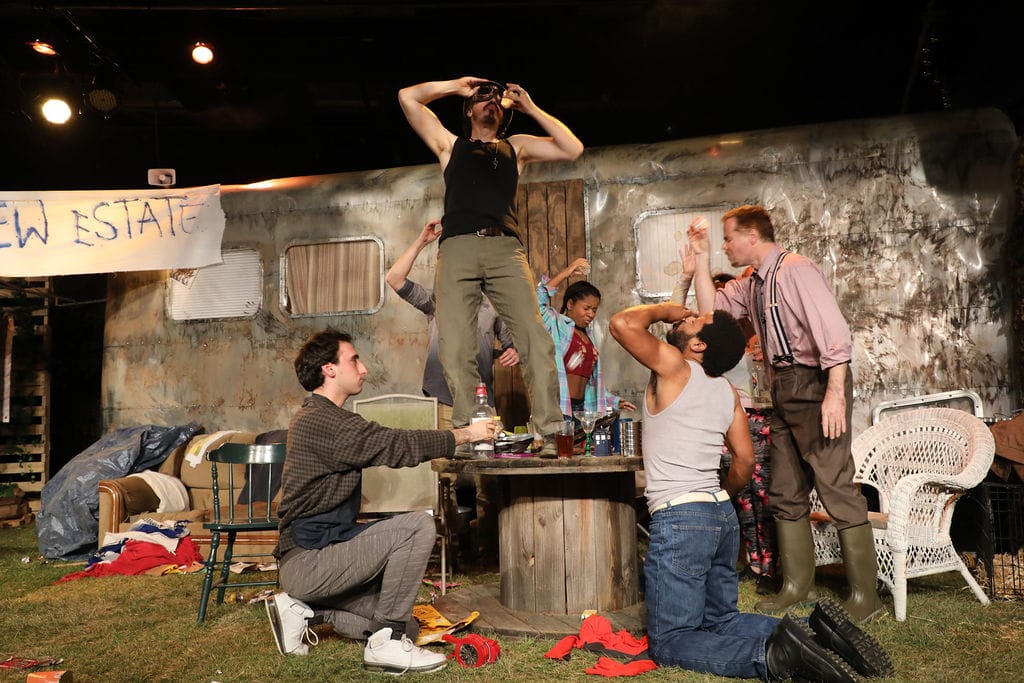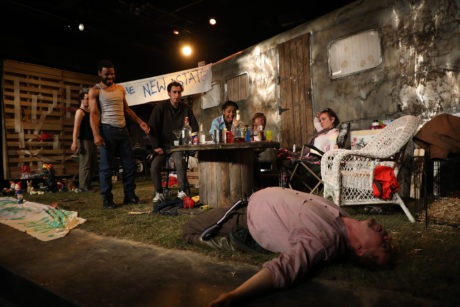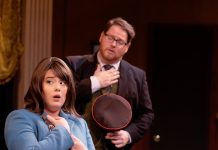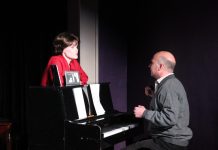People staying when they need to go; people going when they long to stay. People hanging on to bits of myth and legend, or a bit of land, in the face of overwhelming forces of economic logic. Eccentric excess keeping itself at the margins of everyday society. Such is the stuff of Jerusalem, Jez Butterworth’s 2009 play of epic scope and length confined physically to the immediate environs of a decrepit trailer in the woods at the edge of a suburbanizing West England village.

At the center of it all is Johnny “Rooster” Byron, a middle-aged, hard-drinking, drug-dealing, self-mythologizing magnet for generations of disaffected teenagers and a few older lost souls. After nearly 30 years of squatting on village land, Rooster is about to be evicted by the authorities. But the party goes on, with Johnny bellowing defiance at the encroaching world.
It’s a massively demanding role, physically and vocally, created by Mark Rylance in Olivier- and Tony-winning performances. Ian Blackwell Rogers’ performance in the current Fells Point Center Corner Theatre (FPCT) production is up to its demands. Standing tall, chest pulled forward, strutting as befits his nickname, overflowing with Bernard Shaw’s life force, given to pelvic rotations that would do credit to Elvis, telling stories (about dragons, or chats with a 90-foot giant, or jumping obstacles on a motorcycle a la Evel Knievel) that resonate with his listeners regardless of literal truth, Rogers’ Johnny is as charismatic as he is damaged and dangerous. Johnny is often loud, sometimes seductively beguiling, incessantly profane, always focused on his performance of himself and conscious of his effect his audience. One of Johnny’s low points is when he realizes that in one instance, his crew was laughing at him, not with him. Likable he’s not, but you can’t take your eyes off him.
The ensemble surrounding Johnny consists largely of young people who are drawn to an adult who lives on the edge, outside the boundaries of their parents’ community, where they can experience what feels like greater risk and freedom to explore who they are becoming. Despite his emotional ties to the village, Lee (Nate Krimmel) plans to leave for Australia. Davey (Terrance Fleming), working a literally deadening job at the local slaughterhouse, cannot imagine himself anywhere else.
The girls (Dylan McKenzi, Kelly Hutchinson, and, as the enigmatic Phaedra, Molly Cohen) are far less fully drawn, present mostly for the amusement, sexual and otherwise, of the boys and men. The one somewhat adult woman, Dawn (Carolyn Koch), Johnny’s ex, in her one brief scene, is shown not to have outgrown at least some residual attraction to Johnny and his drugs. It is the journeys of men, not women, which concern Butterworth, and brushing off women’s lives, portraying them as disposable adjuncts to men’s, seems in today’s world to be a deficiency of the script.
The adult men in Johnny’s orbit are as lost at sea as the boys. The dim, dependent Ginger (David Shoemaker) seems to have lost most of his brain cells to drugs. Wesley (Michael Salconi), a local pub owner, and a kind of bridge between the village world and Johnny’s Neverland, is sadly beaten down by routine and marital unhappiness. The Professor (Sean Coe, younger than the traditional casting for the role) given to spouting poetry and myth, is barely present in any sort of reality. Troy (David Forrer), Phaedra’s possibly abusive stepfather, is little more than an older version of a thuggish schoolyard bully. In their own ways, none of them has joined adult society any more than Johnny. All the actors give vivid, individualized, distinct life to their characters.
The plot of Jerusalem is not a straight line; it is full of swirls and curves and detours. Director Ann Turiano keeps the play moving along its various paths, changing the pace as needed to bring out its differing moods and colors. It is to her credit that the production succeeds in creating a believable universe far removed from most audience members’ experience. Myth and ritual are an important part of this universe, most graphically in the staging of an LSD eucharist at one point in the second act.
In the FPCT production, Chris Flint’s set design is backstopped by the upstage trailer, in front of which is a debris field – old chairs and sofas, a wooden table, bottles and miscellaneous trash scattered everywhere, an old phonograph, stuffed and toy animals. It is the visual manifestation of Johnny’s cluttered and careless life. The relatively small FPCT stage does not have room for the trees that provided a woodsy feel in larger-scale productions in London and New York, but the setting still creates a sense of separation from town, as the din of the St. George’s Day festival is heard from a distance. Were there to be an American adaptation, the play would fit physically and spiritually in some lost corner of Appalachia.

The play is, however, very thoroughly English (FPCT helpfully provides a glossary of English slang used in the show for playgoers to peruse in the lobby). Its title refers to a William Blake poem that wondered, amidst the Industrial Revolution, whether a new Jerusalem could be built “among these dark Satanic Mills.” Some reviews have suggested parallels to English literature (e.g., Johnny as Falstaffian) or that it was about the state of the English soul or British politics (one of the characters in a recent Toronto production wore a “Leave” t-shirt). Butterworth has consistently resisted such notions, saying that for him the play simply grew out of his characters as they came to him.
Despite his insistence on remaining in a place, and in a state of life, that is no longer sustainable, Johnny does have to move on, whether he likes it or not, compelled by outside forces. As the realization finally dawns, Johnny, for once alone, appears to prepare a private Götterdämmerung, still engrossed in his percussive mythmaking. But is it an ending or a transition? This is one of those shows that provokes interesting conversations as people leave the theater.
Running Time: Three hours and 15 minutes, including two intermissions.
Jerusalem plays through February 3, 2019, at Fells Point Corner Theatre, 251 South Ann Street, Baltimore MD. For tickets, call 410-276-7837 or go online.
Lighting Designer, Janine Vreatt; Costume Designer, Elizabeth Ung; Sound Designer, Devyn DeGuzman





It is in reality a great and useful piece of info.
I am glad that you simply shared this useful info
with us. Please stay us informed like this. Thank you for sharing.